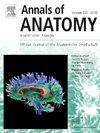Unveiling proteomic targets in the hypothalamus of ovariectomized and estradiol-treated rats: Insights into menopausal syndrome mechanisms
IF 2
3区 医学
Q2 ANATOMY & MORPHOLOGY
引用次数: 0
Abstract
Background
Menopausal syndrome profoundly affects the physical and mental health of many women, drawing increasing attention from the medical community. However, its pathogenesis remains unclear. These symptoms are primarily driven by hormonal fluctuation. The hypothalamus, a key regulator of hormonal balance, potentially playing a critical role in the manifestation of menopausal syndrome.
Methods
We simulated the low-estrogen menopausal state using ovariectomized rats, confirmed the success of ovariectomy via histological analysis of the uterus and vagina, followed by estrogen treatment. TMT-labeled quantitative proteomics, RT![]() qPCR, targeted proteomics and Western blotting were used to identify differentially expressed proteins and their functions in the hypothalamus under low-estrogen conditions.
qPCR, targeted proteomics and Western blotting were used to identify differentially expressed proteins and their functions in the hypothalamus under low-estrogen conditions.
Results
One-way ANOVA (p < 0.05) identified 295 differentially expressed proteins across the sham, ovariectomized and estrogen-treated groups. Post-ovariectomy, 103 differentially expressed proteins were upregulated and 93 were downregulated. Among these, 50 proteins were involved in hormones and neurotransmitters, immunity, metabolism and cardiovascular function. Notably, four proteins—Prkcg, Hsp90ab1, Ywhae, and Gad2—were identified as crucial regulators.
Conclusions
This study elucidates the central molecular mechanism of menopausal syndrome through bioinformatics analysis of differentially expressed proteins in the hypothalamus under low-estrogen conditions, providing novel targets for the treatment of related symptoms.
揭示卵巢切除大鼠和雌二醇处理大鼠下丘脑中的蛋白质组靶点:洞察更年期综合征机制
背景更年期综合征严重影响着许多女性的身心健康,日益引起医学界的关注。然而,其发病机制仍不清楚。这些症状主要是由荷尔蒙波动引起的。方法我们用卵巢切除的大鼠模拟低雌激素绝经状态,通过子宫和阴道的组织学分析确认卵巢切除成功,然后进行雌激素治疗。结果 单因素方差分析(p <0.05)确定了假体组、卵巢切除组和雌激素处理组中有295种不同表达的蛋白质。卵巢切除术后,103 个差异表达蛋白上调,93 个下调。其中,50 个蛋白质涉及激素和神经递质、免疫、新陈代谢和心血管功能。结论 本研究通过对低雌激素条件下下丘脑差异表达蛋白的生物信息学分析,阐明了更年期综合征的核心分子机制,为相关症状的治疗提供了新的靶点。
本文章由计算机程序翻译,如有差异,请以英文原文为准。
求助全文
约1分钟内获得全文
求助全文
来源期刊

Annals of Anatomy-Anatomischer Anzeiger
医学-解剖学与形态学
CiteScore
4.40
自引率
22.70%
发文量
137
审稿时长
33 days
期刊介绍:
Annals of Anatomy publish peer reviewed original articles as well as brief review articles. The journal is open to original papers covering a link between anatomy and areas such as
•molecular biology,
•cell biology
•reproductive biology
•immunobiology
•developmental biology, neurobiology
•embryology as well as
•neuroanatomy
•neuroimmunology
•clinical anatomy
•comparative anatomy
•modern imaging techniques
•evolution, and especially also
•aging
 求助内容:
求助内容: 应助结果提醒方式:
应助结果提醒方式:


